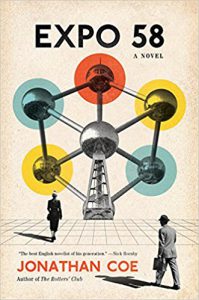Expo 58, by Jonathan Coe
Expo 58
By Jonathan Coe
Houghton Mifflin Harcourt
Five stars
Reviewed by Jessica Gribble
Described by the publisher as “a comic spy caper and international love story,” Expo 58 is just that—and it’s terrific! Jonathan Coe effortlessly combines a Kafka-esque sense of dread and futility with a lighthearted, practical, “jolly-old-chap” British sensibility. Add to that a sly wit akin to Jane Austin, and you have a story in which not much happens, but the reader is thoroughly entertained from beginning to end.
The main character, Thomas Foley, who looks like either Gary Cooper or Dirk Bogarde, mostly does whatever he’s told. He’s sent by his company—without his wife and new baby—to a world’s exposition taking place in Belgium in 1958. The centerpiece is the Atomium. “Something distinctly man-made could be glimpsed: the upper half of what appeared to be a gigantic silver globe. …Three more such globes emerged, set at different heights, and connected to each other by glistening steel tubes. …Already Thomas had the sense of something immense and majestic, something sublime and unearthly that had been imagined on an epic scale by the creators of some science-fiction comic or film, and then transported, by a miracle of human ingenuity and engineering, into the natural world.”
This scene is worth quoting at length, because it sets the tone for the novel: mystery, modernity, technology, wonder. Thomas is almost entirely in opposition to these characteristics. He’s a rule-follower. When he meets the mysterious Mr Wayne and Mr Radford, who seem to know an awful lot about him, considering that they’re strangers, he mostly goes along with what they suggest and require. Even when, later in the novel, they become more coercive, Thomas never openly flauts them. At the expo, Thomas runs a mock British pub, designed to be more light and open than the usual dark wood and dim atmosphere. Nevertheless, in contrast with the Atomium and the ZETA machine (Britain’s attempt at an instrument for nuclear fusion), the Britannia is striving for modernity. A perfect place, then, with the perfect functionary at its helm, to conduct the business of spycraft.
Expo 58 has a fairly small cast of characters, and all are likeable. The danger in the book—from Mr Chersky, a charming though suspicious Russian; from Thomas’s roommate Tony Buttress, who disappears suddenly; from Anneke, the Expo hostess Thomas is enamored of; from Emily Parker, an American who dazzles—never becomes graphic, never explicit. It’s all part of the spying. Like Wayne and Radford, who know everything Thomas doesn’t, the book itself hints at deviousness and intrigue. It’s brilliantly done. It’s also quietly funny, from little details like the waitress at the bar (Shirley Knott) to exchanges that set the 1950s scene for our 2000s sensibilities:
“‘It was lung cancer. He was a heavy smoker.’ The three men stared at him, puzzled by this information. ‘A recent study has shown,’ Thomas explained carefully, ‘that there may be a link between smoking and lung cancer.’ ‘Funny,’ Mr Swaine mused, aloud. ‘I always feel much healthier after a gasper or two.’ There was an embarrassed pause.”
It’s the ambiance of this book that so enchants. The events are interesting, surprising, always lurking on the edge of dramatic, but the scenes and conversations are what remain in your mind. It’s no surprise to find, at the end, an author’s note describing Coe’s research into the real Expo 58; he makes you believe in the scene long before you find out it was real. Expo 58 isn’t a fast-paced crime novel; it’s better than that. It’s a funny, flawlessly written, deftly planned intrigue with memorable characters and a fascinating historical setting and sensibility.
